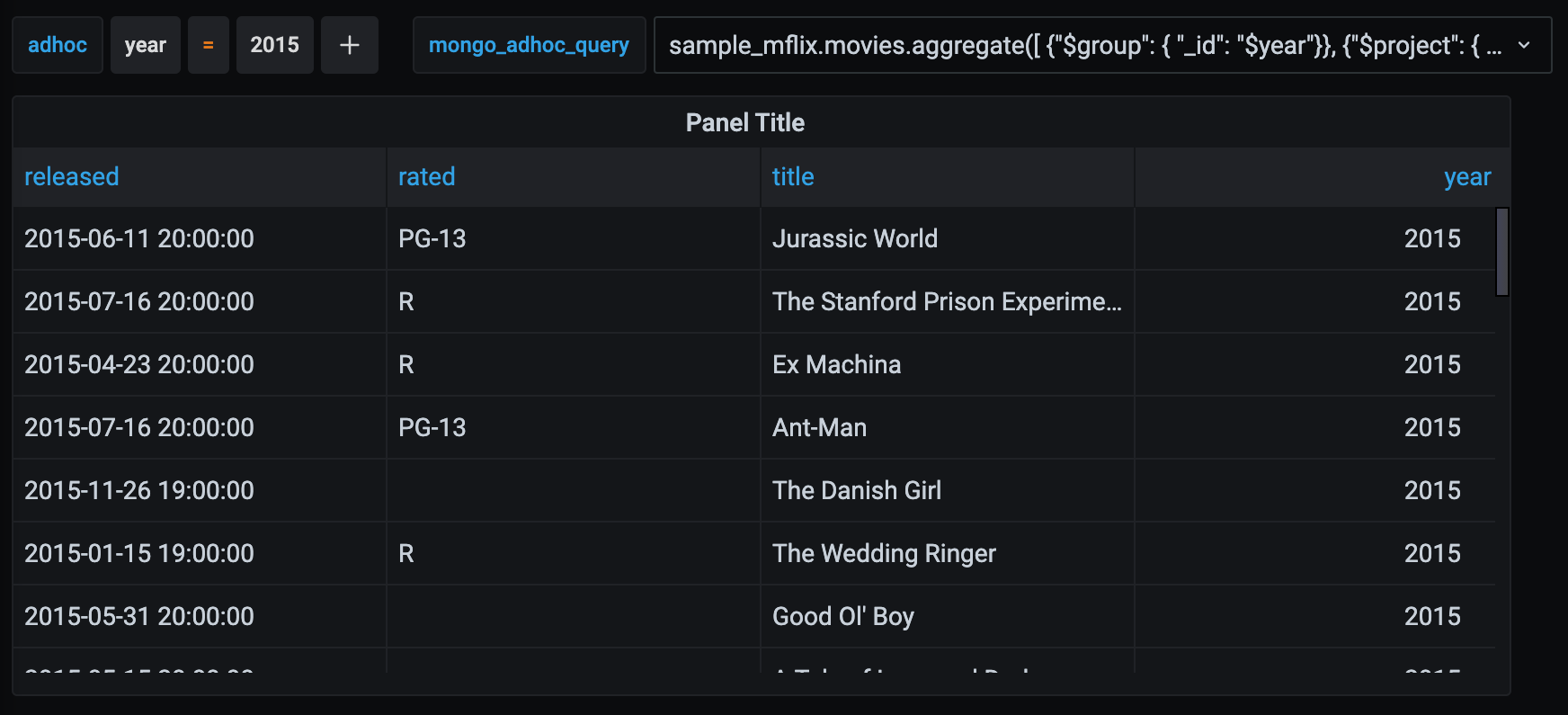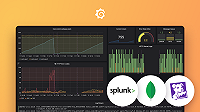MongoDB templates and variables
Instead of hard-coding details such as server, application, and sensor names in metric queries, you can use variables. Grafana lists these variables in drop-down select boxes at the top of the dashboard to help you change the data displayed in your dashboard. A template is any query that contains a variable.
For an introduction to templates and variables, refer to the following documents:
To add a new MongoDB query variable, refer to Add and manage variables. Use MongoDB as your data source.
Following is a sample query that retrieves all movie titles after 1980:
sample_mflix.movies.aggregate([
{"$match": {year: {"$gt": 1980}}},
{"$project": {"_id": 0, "movie_title": "$title"}}
])Compound variables
MongoDB supports compound variables, where a single variable represents multiple values to enable complex multi-key filtering.
Guideline for working with compound variables:
- Naming: Start each individual name with an underscore
(_), and concatenate them using underscores. Avoid spaces. Example:_var1_var2. - Querying: Use an alias where individual names are separated by hyphens (-). Example:
val1-val2. - Referencing: Call your variable by using standard variable syntax. Examples:
$_var1or$_var2.
Example: Filtering results on both movie name and year:
Create a variable and name it
_movie_year.Select MongoDB as the data source.
Retrieve an array of items containing a single movie-year property by using the following query:
sample_mflix.movies.aggregate([ {"$match": {year: {"$gt": 1980}}}, {"$project": {"_id": 0, "movie_year": {"$concat": ["$title", " - ", {"$toString":"$year"}]}}} ]) // [{"movie-year": "Ted - 2016"}, {"movie-year": "The Terminator - 1985"}]Reference
$_movieand$_yearas individual template variables within your query:sample_mflix.movies.find({"title":"$_movie", year: $_year})Use the variable in your MongoDB queries with the appropriate variable syntax.
Using ad-hoc filters
In addition to a standard ad-hoc filter variable (with any name), you must create a second helper variable. This helper variable should:
- Be of
constanttype - Be named
mongo_adhoc_query - Have a value compatible with the query editor.
The query result will populate the UI’s selectable filters. Since this variable has no further purpose, you may choose to hide it from view.
Consider the following query:
sample_mflix.movies.aggregate([ {"$group": { "_id": "$year"}}, {"$project": { "year": "$_id", "_id": 0 }} ] )After adding a selected value, the output appears as follows:

Other supported functionalities
The following functionalities are supported, with example queries:
ObjectIdtype support
sample_mflix.movies.find({"_id": ObjectId("573a1390f29313caabcd4803")})
sample_mflix.movies.find({"_id": {$in : [ObjectID("573a1391f29313caabcd6f98"), ObjectID("573a1392f29313caabcd9dee"), ObjectID("573a1392f29313caabcd9ca6")] }})Regex search support
- With double quotes:
sample_mflix.movies.find({"title": {$regex: "ace", $options: "$i"} })- With single quotes:
sample_mflix.movies.find({"title": {$regex: 'ace', $options: "$i"} })- With pattern
sample_mflix.movies.find({"title": /ace/i })$__timeFrom/$__timeTomacros support
sample_mflix.movies.find({"tomatoes.dvd": { $gt: $__timeFrom}}).limit(10)
sample_mflix.movies.find({ $and: [{ "tomatoes.dvd": { $gte: $__timeFrom }}, { "tomatoes.dvd": { $lt: $__timeTo }}]})ISODatetype support
sample_mflix.movies.find({"tomatoes.dvd": { $gte: ISODate("2013-03-01") }})
sample_mflix.movies.find({"tomatoes.dvd": { $gte: ISODate(1719600176123) }})
sample_mflix.movies.find({"tomatoes.dvd": { $gte: ISODate("2024-07-04T13:06:55Z") }})
sample_mflix.movies.find({"tomatoes.dvd": { $gte: ISODate() }})new Datetype support
sample_mflix.movies.find({"tomatoes.dvd": { $gte: new Date("2013-03-01") }})
sample_mflix.movies.find({"tomatoes.dvd": { $gte: new Date(1719600176123) }})
sample_mflix.movies.find({"tomatoes.dvd": { $gte: new Date("2024-07-04T13:06:55Z") }})
sample_mflix.movies.find({"tomatoes.dvd": { $gte: new Date() }})Datedate string type support
sample_mflix.movies.find({"tomatoes.dvd": { $gte: Date("2013-03-01") }})
sample_mflix.movies.find({"tomatoes.dvd": { $gte: Date(1719600176123) }})
sample_mflix.movies.find({"tomatoes.dvd": { $gte: Date("2024-07-04T13:06:55Z") }})
sample_mflix.movies.find({"tomatoes.dvd": { $gte: Date() }})"$$NOW"date string type support
sample_mflix.movies.find({"tomatoes.dvd": { $gte: "$$NOW" } }})Date.now()timestamp (milliseconds since Unix epoch) type support
sample_mflix.movies.find({"tomatoes.dvd": { $gte: Date.now() } }})The plugin as of version 1.21.0 supports basic arithmetic after Date.now(). For example can be used to fetch timestamps from 15 seconds ago
sample_mflix.movies.find({"tomatoes.dvd": { $gte: Date.now() - 15 * 1000, $lt: Date.now() } }})Debugging response size
Debugging response size refers to analyzing and troubleshooting the size of a response returned by a system, which can help identify issues with performance and truncated or missing data.
Note
The debugging response size feature is not currently supported in Grafana Cloud.
GF_PLUGIN_LOGGER_LEVEL can be configured either as an environment variable or in the grafana.ini configuration file, as shown in the following example:
[plugin.grafana-mongodb-datasource]
# the log level to capture
# either 1 (traces) or 2 (debug) will work
logger_level = 2After each query, the MongoDB plugin logs information regarding the response size.



